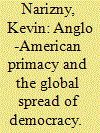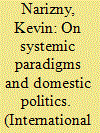| Srl | Item |
| 1 |
ID:
111847


|
|
|
|
|
| Publication |
2012.
|
| Summary/Abstract |
For the past three centuries, Great Britain and the United States have stood in succession at the apex of the international hierarchy of power. They have been on the winning side of every systemic conflict in this period, from the War of the Spanish Succession to the Cold War. As a result, they have been able to influence the political and economic development of states around the world. In many of their colonies, conquests, and clients, they have propagated ideals and institutions conducive to democratization. At the same time, they have defeated numerous rivals whose success would have had ruinous consequences for democracy. The global spread of democracy, therefore, has been endogenous to the game of great power politics.
|
|
|
|
|
|
|
|
|
|
|
|
|
|
|
|
| 2 |
ID:
155884


|
|
|
|
|
| Summary/Abstract |
Both Gideon Rose's neoclassical realism and Andrew Moravcsik's liberalism attempt to solve the problem of how to incorporate domestic factors into international relations theory. They do so in very different ways, however. Liberalism is a “bottom-up” perspective that accords analytic priority to societal preferences; neoclassical realism is a “top-down” perspective that accords analytic priority to systemic pressures and treats domestic factors as intervening variables. These two approaches are not equivalent, and the choice between them has high stakes. Although it has gained rapidly in popularity, neoclassical realism is fundamentally flawed. Its intellectual justification is weak; it is logically incoherent; and it induces the commission of methodological errors. Realism can incorporate certain domestic factors without losing its theoretical integrity, but it does not need and should not use neoclassical realism to do so.
|
|
|
|
|
|
|
|
|
|
|
|
|
|
|
|
| 3 |
ID:
055726


|
|
|
| 4 |
ID:
172887


|
|
|
|
|
| Summary/Abstract |
The dominant interpretation of the Glorious Revolution portrays it as an innovative compromise that used clever institutional design to solve a coordination problem between rival elites. In contrast, I argue that it was neither innovative nor a compromise and that it was the product of structural change rather than institutional design. Following Barrington Moore, I focus on the rise of agrarian capitalism and economically autonomous elites, who, in contrast to rent-seeking elites, do not depend on favor from the state for their income. They have an interest in the creation of a political system that ensures their equal rights under the law, open access to markets, and opportunities to form broad coalitions against rent-seeking. This makes them a critical constituency for representative government. I test this argument through an analysis of patterns of allegiance for Crown and Parliament at the outset of the English Civil War and address its relevance to the Glorious Revolution.
|
|
|
|
|
|
|
|
|
|
|
|
|
|
|
|